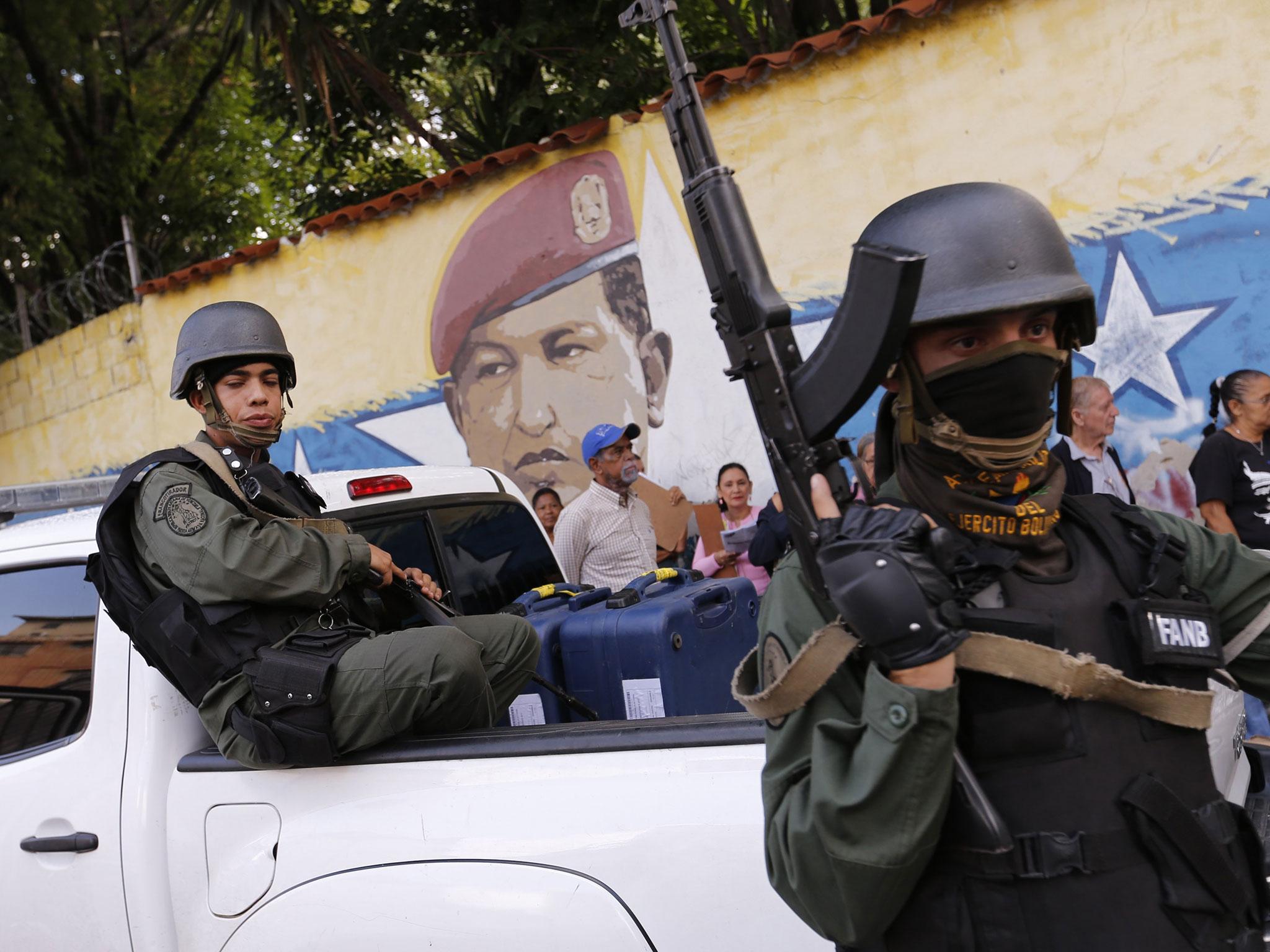Venezuela may be on the brink of civil war and the US – for once – should keep its nose out
The country is deeply polarised and things are only set to get worse

“A spokesperson for emperor Donald Trump said that they would not recognise the results of Venezuela’s constituent assembly election,” Maduro told a cheering crowd. “Why the hell should we care what Trump says. We care about what the sovereign people of Venezuela say.”
On Monday, the US imposed sanctions on Maduro personally, giving himself something else to rail against. In truth, the scolding of Venezuela by Washington is nothing new, and neither is the sight of a Venezuelan leader pouring cold scorn on such criticism. Who doesn’t remember Hugo Chavez standing at the UN and theatrically denouncing George W Bush as “the devil” and claiming the podium still bore the trace of his sulphur?
But this is not 2006 and Nicolas Maduro is not Hugo Chavez. Chavez was a controversial but charismatic leader who used his country’s oil wealth to invest in education and social welfare programmes for the country’s poor. If he carried with him an authoritarian tendency, he also built his so-called Bolivarian Revolution around the ballot box. He was elected president no fewer than four times.
Eleven years on, the people of Venezuela are less fortunate. While Chavez wanted Maduro to succeed him, and he won an election in 2013 to ensure their United Socialist Party of Venezuela retained the presidency, Maduro has few of the political skills of the man he has followed. With an approval rating at around 20 per cent, Maduro has surrounded himself increasingly with his hard core supporters.
“These are people who haven’t gone grocery shopping in 15 years,” Eva Golinger, a US lawyer who became a supporter and confidant of Chavez, recently told Reuters. “They don’t walk the streets. They're not taking the subway.”
Golinger told The Independent she believed many who still supported Maduro did so because they feared what would happen if the conservative opposition were to take power. “They are still supporting Maduro because Chavez told them to,” she said.

And unlike in 2006, Venezuela’s economy is now in dire circumstances. Back then oil was selling at $70 a barrel; today it is less than $50. Inflation is running at 600 per cent and for those people without government or military connections, there are shortages of basic items, including food. Public anger and frustration grows daily.
The result has been months of protests, many of them led by the opposition parties and figures such as Leopoldo Lopez and Henrique Capriles, the latter who belongs to the conservative Primero Justicia party and who narrowly lost to Maduro in 2013 when he ran as the opposition coalition's candidate. Reports suggest that at least 125 people have been killed in the last few months alone.
Such opposition figures promote themselves as the democratic salvation of the country. Critics claim they are in truth nothing more than promoting the interests of Venezuela’s traditional, pro-Washington elite. They also point out that both Lopez and Capriles supported the 2002 coup that briefly unseated Chavez.

Now, thrown into this already chaotic mix, is the impact of sanctions from the US. Last week, the Trump administration imposed measures against 13 figures close to Maduro.
Following Sunday’s vote for a constituent assembly that opponents of Maduro said was nothing more than an attempt to cement his control, it is reportedly planning more, and is even willing to target Venezuela's oil sector. At the moment, the US still buys 700,000 barrels a day from Caracas.
US meddling in Latin America and its opposition to those governments who reject the "Washington Consensus" is nothing new. Washington has been seeking a change of government in Venezuela since Chavez was elected. In July, the Director of the CIA all but admitted his agency was working with Mexico and Colombia to bring about such a transition.
Yet Mark Weisbrot, a regional expert and co-director of the Centre for Economic and Policy Research, said the new dynamic could be especially perilous.
He said fresh sanctions would badly harm ordinary Venezuelans, few of whom support such measures, and will worsen the economy of an already divided and polarised nation.
Weisbrot has warned that with Maduro controlling an army of 100,000 troops, and even more members of armed militias, the prospect for bloody civil conflict is all too real.
He is one of many who believe the only way to avoid this is genuine dialogue and negotiation. Key to this, is persuading both sides that whichever side loses the next presidential election, scheduled for October 2018, must accept the result.
At the same time, all people must go to the polls without fearing the victors will carry out the sort of retribution and killing that took place after the 2002 coup.
Achieving such dialogue is far from simple, and it needs a trusted interlocutor – the US, for once, should keep its nose out – yet it is not impossible.
The alternative is that the protests and killings will continue and the death toll will keep mounting.
Join our commenting forum
Join thought-provoking conversations, follow other Independent readers and see their replies
Comments
Bookmark popover
Removed from bookmarks